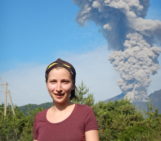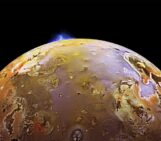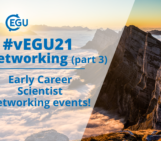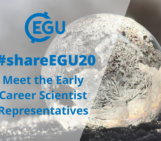
Hello Georgia – welcome to GeoTalk! Could you tell our readers a little bit about yourself and your background?
Thank you, Simon! I’m Georgia Moutsiana, a space scientist and PhD candidate at the National and Kapodistrian University of Athens, Greece. My research focuses on understanding the processes that accelerate and transport charged particles in planetary magnetospheres.
My key message is that studying magnetospheres can unlock answers to fundamental questions about planetary exploration and radiation protection. These studies also contribute to understanding planetary system dynamics in general.
Specifically, I compare these mechanisms in Earth’s and Jupiter’s magnetospheres, using data from NASA’s Van Allen Probes mission and Juno mission respectively. Throughout my university studies, I’ve been intrigued by how magnetic fields shape planetary environments, and working with members of the Juno team has allowed me to dive deeper into related phenomena.
Beyond research, I’m passionate about fostering collaboration and inclusivity within the scientific community. As the Early Career Scientist (ECS) representative for the Planetary and Solar System Sciences (PS) Division of the EGU, I aim to support ECS and work to create networking opportunities for them in this exciting field.
The recent Juno and JUICE missions allow us to discover more about what’s happening on Jupiter’s magnetosphere. How can such data help your research?
My research has definitely benefited and been inspired by the Juno mission. As for JUICE, it’s arriving at Jupiter in approximately 7 years from now, so hopefully its data will come to complement my research findings!
The Juno mission has been key to advancing our understanding of Jupiter’s magnetosphere: Juno’s JEDI instrument is capable of providing both high-resolution time data of high-energy ions and electrons, and thanks to Juno’s orbit, we are capable of detecting such particles in Jupiter’s magnetotail—a region where dynamic magnetic reconnection processes occur.
In an increasingly technology-driven world, researching the magnetosphere is essential for maintaining the reliability and resilience of our infrastructure.
My research leverages these observations to study how particles are accelerated and transported during these events. Moreover, I generate global maps of the differential fluxes of hydrogen, oxygen, and sulfur ions in a suitable magnetic coordinate system. This helps us acquire a better understanding of the ion distributions across the regions of Jupiter’s magnetosphere, offering exciting new insights into the spatial dynamics of these charged particles.
What makes Juno’s data so impactful is its ability to capture the unique features of Jupiter’s magnetic field and plasma distributions, which are influenced by the planet’s rapid rotation and the volcanic activity of its moon Io, respectively. By comparing these findings with data from Earth’s magnetosphere, I aim to identify common plasma processes and explore the differences that arise from Jupiter’s unique environment. This comparative approach contributes to our understanding of planetary magnetospheres and helps to inform studies of other planetary systems, including exoplanets.
The European Space Agency’s JUICE mission, although primarily focused on Jupiter’s icy moons, will also provide valuable data on the planet’s magnetosphere and its interactions with these moons. Together, these missions will expand our understanding and build a more comprehensive view of the complex Jovian system.
The space sciences impact much of what we do here on Earth, and yet how it helps can sometimes be a little ambiguous to those not close to the topic. How does studying the magnetosphere affect us terrestrials?
The magnetosphere is Earth’s natural shield, protecting us from harmful solar and cosmic radiation. By studying its dynamics, we can better predict and mitigate the effects of space weather events, such as geomagnetic storms, which can disrupt satellites, navigation systems, and even power grids.
In an increasingly technology-driven world, researching the magnetosphere is essential for maintaining the reliability and resilience of our infrastructure. Additionally, magnetospheric research has implications for space exploration and operations, so understanding how they interact with their internal and external environments is key to ensuring the safety of both astronauts and spacecraft.
As a researcher in the planetary sciences, what is your key message about the magnetosphere?
Magnetospheres are dynamic and complex systems that offer a wealth of information about how planets interact with their parent stars and their moons.
My key message is that studying magnetospheres can unlock answers to fundamental questions about planetary exploration and radiation protection. These studies also contribute to understanding planetary system dynamics in general. Understanding magnetospheres is not just about academic curiosity but is also critical to the sustainability and safety of planetary environments, both on Earth and beyond.
You’re also the Early Career Scientist Representative for the Planetary and Solar System Sciences (PS) division. What do you do in this role, and how can people get involved?
As the ECS representative for the PS Division, my role is to support early career scientists and foster a vibrant, inclusive community within the broader EGU network. Along with ECS representatives of other scientific divisions and the PS Division Team, I organise events such as networking sessions, workshops, and short courses during the EGU General Assembly, as well as virtual events, like seminar-style EGU Campfires, which take place throughout the year. These activities are designed to help researchers connect, interact, share ideas, network, and develop professionally.
For those looking to get involved, there are many ways to participate! You can contribute to the division’s blog, attend networking events, or volunteer to help organise EGU activities for ECS. The PS division is always looking for fresh perspectives and enthusiastic contributors, so if you’re interested, please don’t hesitate to reach out!







Alex joo
Thank you for this insightful interview with Georgia Moutsiana! It’s fascinating to learn about her research on Jupiter’s magnetosphere and how it contributes to our understanding of planetary science. The complexity of Jupiter’s magnetic field and its interactions with the solar wind is truly captivating. I’m excited to see how this research might influence future space missions and studies of other gas giants. Keep up the great work in making such complex topics accessible to a wider audience!